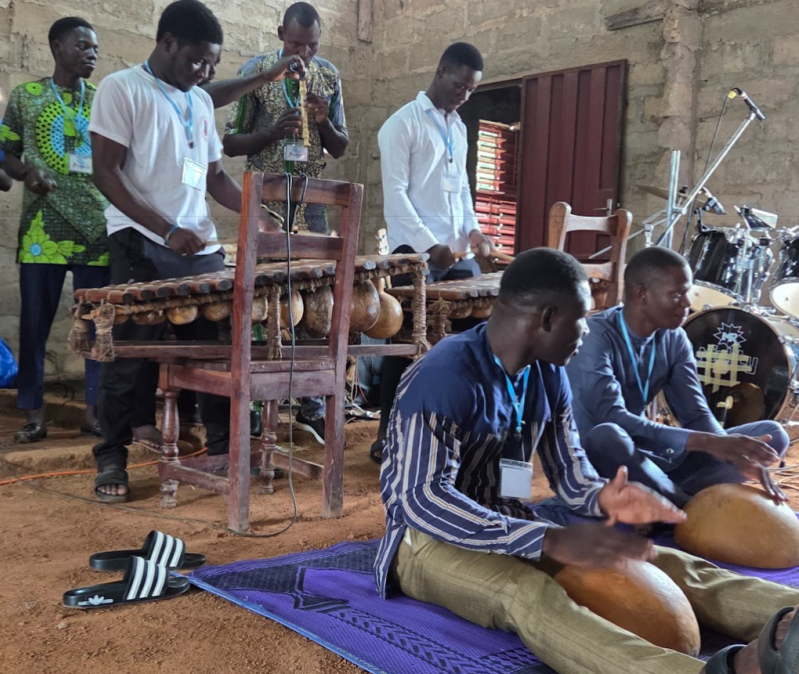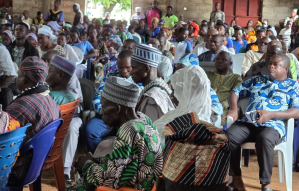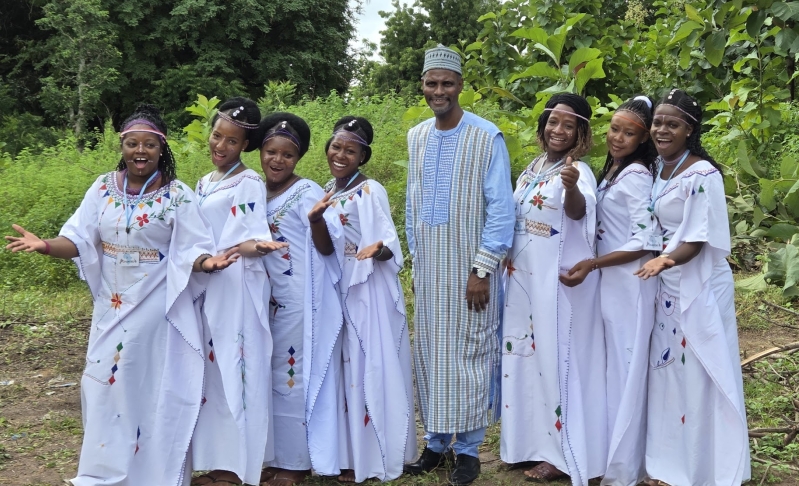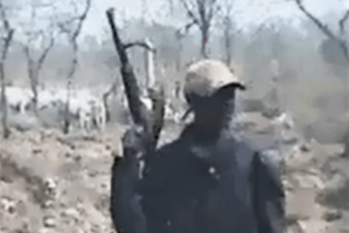
In a small village called Bethlehem in the Northwestern region of Benin, an annual festival of culture and music has been bringing together 20 diverse ethnic groups, and diffusing economic, social and religious tensions that have fuelled violent extremism in West Africa. The 10th edition of the Africa Sings Festival, held on Aug. 15-17, 2025, targeted social cohesion between herder and farmer communities living in a region predominantly and historically occupied by Christians and Muslims.
"The general objective of the festival is to promote social cohesion, peace, and non-violence in the coexistence of communities through intercultural exchanges and the celebration of ethnoarts," said Dr. Daniel Dama, the founder of Africa Sings, a Christian Benin-based NGO which organizes the festival.
Dama explained that Africa Sings' biblical values of peace and reconciliation underpins the festival especially in a context where ethnic groups, representing various faiths and beliefs, have "co-existed for decades, often facing periods of unrest."
"The Donga region, where the festival took place, is home to predominant farming communities like the Yoa, Lokpa, Otamari, and Somba, living alongside the largely nomadic Fulbe (Fulani herders) - a dynamic that can frequently lead to conflict," said Dama. "Furthermore, the escalating security concerns across West Africa, particularly in Benin, underscore the urgency of initiatives like Africa Sings, especially as surveys indicate that conflicts between agricultural and pastoral communities often serve as a breeding ground for violent extremism."
The festival not only celebrated the rich tapestry of West African ethnoarts but also ignited dialogue for peace and spiritual exploration across diverse communities and faiths, an outcome that Dama believes is aligned to the Global Ethnodoxology Network (GEN) where he serves as a member of the advisory council. Ethnodoxologists, like Dama who has a Ph.D. in Intercultural Studies, immerse themselves in exploring and studying how Christians in every culture can engage with God and the world through artistic expressions.
“For example,” Dama elaborated, “African Christians and artists do not need to be ashamed of playing traditional fiddles, bamboo flutes and introducing indigenous dancing steps into Church. Today, unlike before, African Christians freely express their faith in Christ in their own heart language, music, songs, and dances. Consequently, many souls are added to the Kingdom.”
Dama told Christian Daily International that ethnodoxology plays a vital role "by encouraging the integration of local African music, dance, storytelling, and other cultural art forms into Christian worship, making the Gospel message more relevant and understandable."
He further explained that this form of evangelism seeks to avoid the imposition of Western styles of worship by "valuing and utilizing indigenous artistic expressions to connect with local worldviews."
In an earlier interview with Christian Daily International, Héber Negrão, the president of GEN, expounded that ethnodoxology is not limited to academic studies but explores the practical relevance of different cultures in Christianity. “We call it multidisciplinary because it’s not just about music or ethnomusicology. We draw on anthropology, worship studies, sociology, and the arts. It’s like a Swiss army knife of disciplines that contribute to the same goal,” explained Negrão.

The three-day festival in Benin was designed to engage different audiences and achieve specific outcomes. The theme for day one was 'Intellectual and Spiritual Exchange' dedicated to presentations, with a targeted audience including church leaders, missionaries, artists, and choir leaders. It served as a vital crucible for practitioners and academics to engage in discussions on various topics, including those often considered sensitive or taboo within the community.
Day two was the core of the festival's outreach, attracting a kaleidoscope of arts and culture presentations through an exhibition.
"We targeted a broad, inclusive audience especially from the Muslim faith, various ethnic groups, races, and artists. Here, artists from across the region performed and exhibited their cultural savoir faire and heritage, showcasing vibrant dances, soul-stirring music, traditional outfits, and delicious culinary arts. This day is a powerful demonstration of shared humanity through artistic expression," stated Dama.
On day three, the festival culminated with a Sunday Worship and Music competition. While the day was explicitly targeted at Christians, the organiser also invited "all other people," aiming to revive those who have strayed from their faith and, significantly, inviting non-Christians to consider Christ.
This segment is a strategic effort to promote ethnodoxology and contextualized Christian musicality, nurturing the next generation of Christian artists. Ethnic groups and faiths that would otherwise not be in the same forum were brought together by music, dance and art, providing a catalyst for reconciliation and peaceful co-existence.
The impact of the festival was best illuminated by the uplifting testimonies from attendees, curated by Dama. A respected local king, whose name was withheld for privacy, confided that the festival marked his very first time entering a church building. He described how hearing "the genre of his music and songs performed so well in the church gave him the confidence and unusual courage to go into the church." Once inside, he "felt welcomed by the soundscape of the Christian singing groups and all worshippers. I wished my royal position would allow me to convert to the Christian faith".
Another Muslim attendee described feeling "honored and humbled" by the invitation to a Christian-organized festival on church premises. Despite initial hesitation to enter the church due to his faith, the "smiles and the songs and dances echoing from the church speeded up my steps." Once inside, he was initially uncomfortable until Dama shook his hand with a large smile and said, "you are amid the family of God, you belong here, feel at home and thank you for honoring our invitations..." This simple act of love and welcome dramatically shifted his "wrong perspectives about Christians from this time".
A leader of one of the region's largest ethnic groups, predominantly Muslim, initially took issue with Dama for not inviting his community to the cultural event. "I am the leader of one of the largest ethnic groups in this region with a large percentage of Muslims," said the influential leader. "I came to quarrel Dr. Dama because he did not invite me to this important cultural rendez-vous… the arts Africa Sings belongs to everybody, it is the community’s heritage, regardless of ethnicity, faith and political differences. You’ve denied us the opportunity to contribute to peace… but since you have apologized, your apologies are accepted, but you must repeat this event in the nearest future to give us the opportunity to redeem ourselves.”

Dama sees the relevance and urgency of exploring ethnodoxology as a means of winning the hearts of African communities towards the gospel as more "African Christians are seeking desperately to return to their ancestral artistic practices as they worship God in the church context."
The different art forms of dance, music and idioms have enabled many communities to better appreciate the Bible and find ways of integrating cultural traditions with the Gospel.






